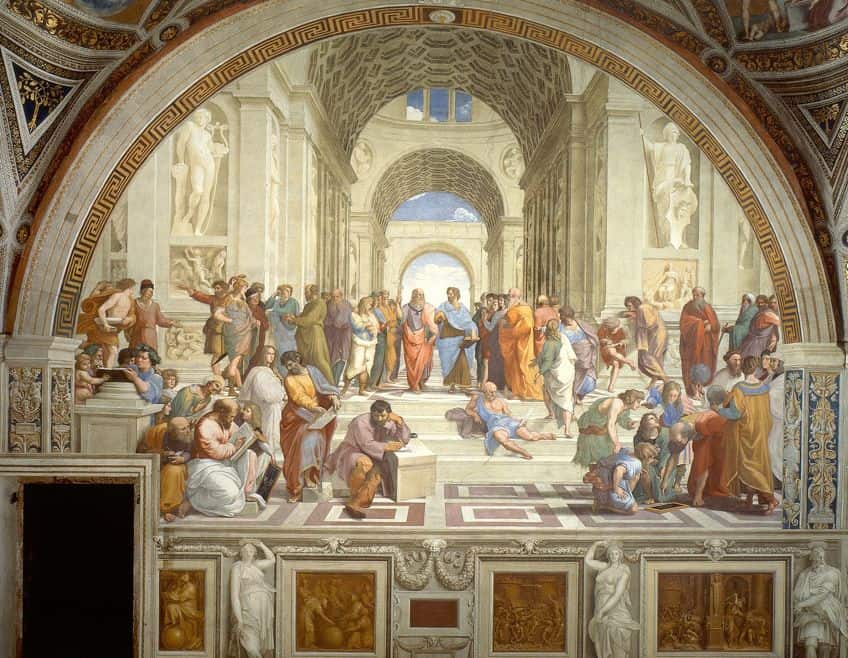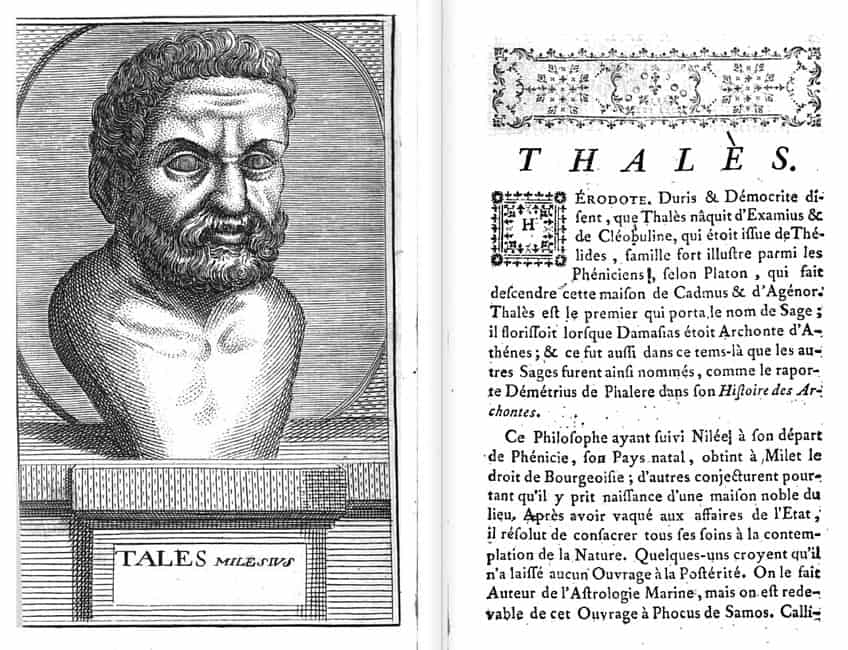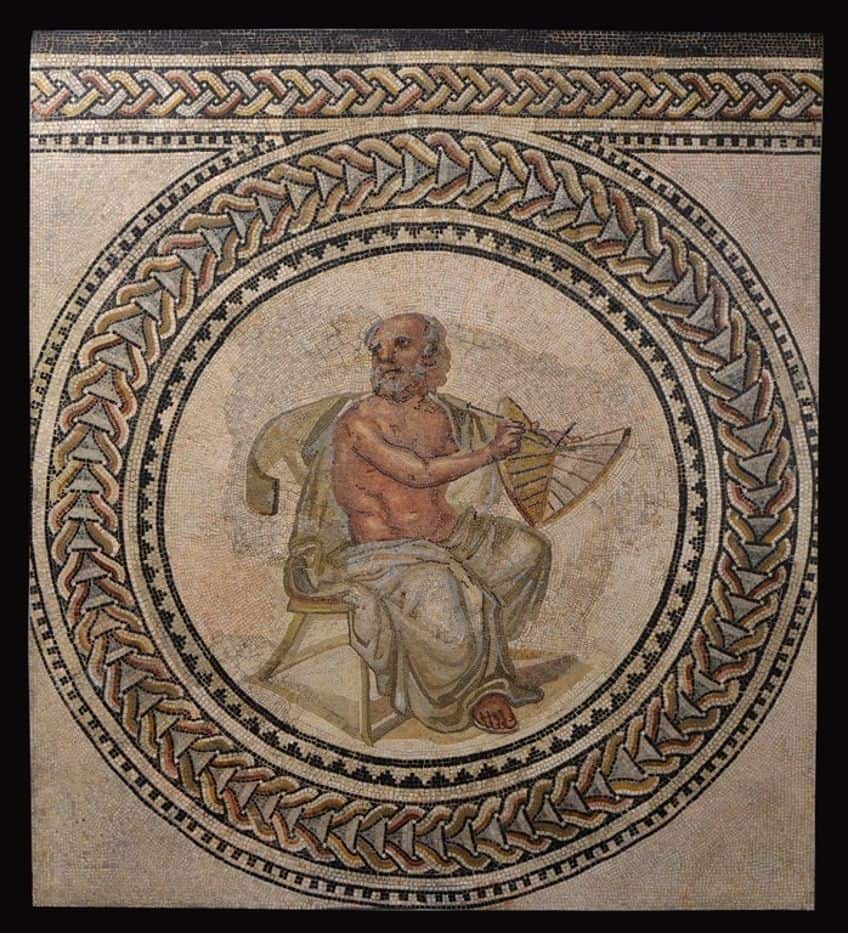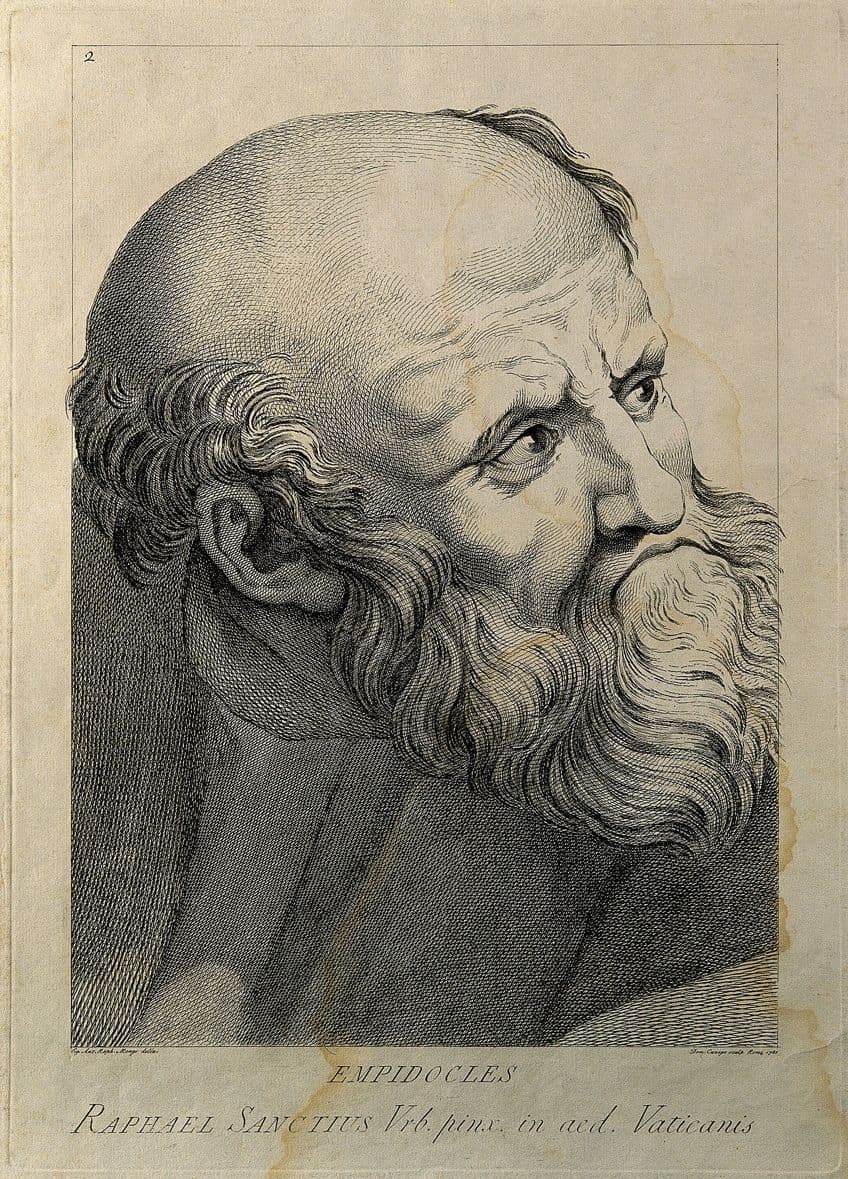Famous Greek Philosophers – Ancient Greek Philosophy
There’s no denying that the early Greek philosophers were the forefathers of Western intellectual discourse. In fact, ancient Greek philosophy was where the entire discipline began, with even the word “philosophy” being Greek in origin. These famous Greek philosophers utilized reason and logic to understand the world around them, instead of the religious outlook that had dominated human history up to that point. This article will explore the greatest Greek philosophers of all time and the philosophies that brought them renown.
History’s Most Famous Greek Philosophers
The early Greek philosophers spent countless hours discussing the observations they made about human behavior and consciousness. They tried to make sense of the world without being swayed by the mythological and spiritual beliefs of the time. The greatest Greek philosophers shaped the way Western civilizations would think and perceive the world around them for thousands of years after. Let’s take a look at the most notable figures in ancient Greek Philosophy.

Thales of Miletus (624 – 546 BCE)
| Philosopher Name | Thales of Miletus |
| Date of Birth | c. 624 BCE |
| Date of Death | c. 546 BCE |
| Place of Birth | Miletus, Ionian League (Modern-day Turkey) |
Thales of Miletus was a mathematician, philosopher, and astronomer who founded the Milesian philosophical school. Little is known about his early life, however, he is said to have been born into a rich family in the city of Miletus, which is today in Turkey. He was an expert navigator and is believed to have anticipated a solar eclipse in 585 BCE, earning him the reputation of a great thinker. Thales’ philosophy was founded on the belief that the cosmos is made up of one substance, which he thought was water. He thought that this substance was the origin of all things and that all other things descended from it. The notion that substance is alive and that all things have a soul is called hylozoism.
Thales also thought that natural rules regulated the world and that science and mathematics could explain these principles.
Thales is also recognized for his advances in geometry, which included the discovery of various geometric theorems. He is credited with establishing the theorem stating that a right triangle is a triangle enclosed in a circle with one of the sides as the diameter. He is also renowned for making significant contributions to astronomy, including the already noted predictions of the solar eclipse. His theories laid the foundations for the advancement of both science and philosophy in ancient Greece and impacted later intellectuals like Anaximenes and Anaximander.

Anaximander (610 – 546 BCE)
| Philosopher Name | Anaximander |
| Date of Birth | c. 610 BCE |
| Date of Death | c. 546 BCE |
| Place of Birth | Miletus, Ionia, Asia Minor |
Pre-Socratic philosopher Anaximander flourished in the sixth century BCE in Miletus, a Greek city in Asia Minor. He was a pupil of Thales, another famous Milesian philosopher, and rose to prominence as a member of the Milesian school of thought. While little is known about Anaximander’s lifetime, he is credited with making significant contributions to ancient Greek philosophy. Anaximander, according to legend, drew a map of the globe and was the very first person to use the term “cosmos” to describe the organized universe. He is also thought to have taught Pythagoras, the famed philosopher, and mathematician who we also cover on this list. His philosophy revolved around the idea of “apeiron,” which he saw as the primal material of the cosmos.
Apeiron is a non-physical element that is unlimited, eternal, and undefined.
Anaximander thought that everything arises from the Apeiron and returns to it in a never-ending cycle of birth and destruction. Anaximander’s cosmology also proposed that the Earth was cylindrical rather than flat, as was widely assumed at the time. He argued that the Earth was hanging in space and that the stars and heavenly bodies revolved around it. Anaximander also thought that humans descended from sea-dwelling fish-like animals. The philosophy of Anaximander influenced the development of Greek cosmology and metaphysics. His beliefs about the world and the underlying nature of all things have left an enduring imprint on Western philosophy and science.

Pythagoras (570 – 495 BCE)
| Philosopher Name | Thales of Miletus |
| Date of Birth | c. 570 BCE |
| Date of Death | c. 495 BCE |
| Place of Birth | Miletus, Ionian League (Modern-day Turkey) |
Pythagoras is regarded as one of the most influential philosophers in the formation of Western philosophy, including advances in music theory, mathematics, and astronomy. Little is documented about his early life, however, he is thought to have been born on the Greek island of Samos. Pythagoras established the Pythagorean Brotherhood, a religious and intellectual school in southern Italy. The Brotherhood was a secret society dedicated to enlightenment and the pursuit of science and mathematics. He was even considered a religious leader and was thought to have mystical abilities. Pythagoras is most remembered for his advances in mathematics, notably the Pythagorean theorem.
He also made significant advances in music theory, such as discovering the mathematical link between string length and pitch of the sound produced.
Pythagoras’ philosophy was founded on the concept that mathematical rules control the cosmos. He claimed that everything in the cosmos, including humans, is made up of numbers and that mathematics was the secret to comprehending the essence of reality. Pythagoras also believed in soul transmigration or the belief that the soul is everlasting and will be reborn into a new body after death. Pythagoras’ philosophy also addressed the idea of harmony, which he considered to be critical to comprehending the universe’s order and structure. He saw the cosmos as a musical instrument, with planets and stars moving in unison to create a cosmic symphony. This concept informed his views on music, which he regarded as a means of connecting the human soul with the divine.

Anaxagoras (510 – 428 BCE)
| Philosopher Name | Anaxagoras |
| Date of Birth | c. 510 BCE |
| Date of Death | C. 428 BCE |
| Place of Birth | Clazomenae, Ionia, Asia Minor |
Anaxagoras is thought to have been born into a wealthy family at Clazomenae, an affluent city on the coast of modern-day Turkey. It is believed that he may have journeyed to Egypt as a young man, where he is thought to have studied geometry and astronomy. He eventually traveled to Athens, which was a hub of intellectual and artistic activity at the time. The nous, or mind, was at the heart of Anaxagoras’ philosophy. He thought that the cosmos was made up of an unlimited number of microscopic particles, which he named seeds, and that the nous put them in action. Anaxagoras held that the nous was essential for the universe’s structure and order and that it was the foundation of all human understanding and knowledge.
Anaxagoras’ philosophy fundamentally rejected widespread belief in gods and the supernatural.
He argued that natural laws regulated the cosmos and that these rules could be grasped through logic and observation. He was also a supporter of the scientific method, and he is recognized as being among the first philosophers to verify his ideas by observation and experiments. Anaxagoras’ views and philosophy made him a divisive figure in Athens, and he was eventually convicted of blasphemy for rejecting established religious beliefs. He was driven to abandon the city to avoid punishment and lived in exile for the remainder of his life. It is unknown where Anaxagoras resided during this period, although he is said to have continued to write and taught philosophy until his passing.

Empedokles (483 – 330 BCE)
| Philosopher Name | Empedokles |
| Date of Birth | c. 483 BCE |
| Date of Death | c. 330 BCE |
| Place of Birth | Akragas, Sicily |
Empedocles was born around 483 BCE in the city of Acragas, which is now known as Agrigento in modern-day Italy. Empedocles played a major role in the development of Western scientific and philosophical thought, and his ideas inspired subsequent thinkers such as Lucretius and Aristotle. Empedokles was a polymath who made substantial contributions to science, philosophy, and medicine, among other subjects. He is well known for his four-element theory, which stated that all matter was made up of air, earth, fire, and water. Empedocles also believed in cosmic cycles, in which the universe went through phases of development and decay. He was also well-known for his fascination with medicine and healing.
He claimed that the human body was made up of four components, and that sickness resulted from an imbalance of these forces.
Empedocles pushed for a comprehensive approach to healing that encompassed emotional and spiritual therapies in addition to physical treatments. He was also a poet who composed various works, notably “On Nature,” a poem that summed up his philosophical principles. He was noted for his utilization of metaphor and imagery in his poetry, and his work influenced many subsequent poets and philosophers. His studies set the groundwork for the advancement of natural philosophies and science, and his focus on holistic treatment had a long-lasting influence on medical practice.

Socrates (469 – 399 BCE)
| Philosopher Name | Socrates |
| Date of Birth | c. 469 BCE |
| Date of Death | 15 February 399 BCE |
| Place of Birth | Alopese, Greece |
Socrates was among the most famous Greek philosophers and was born about 469 BCE in Athens. He was the child of a sculptor father and a midwife mother, and he began his career as a stonemason before turning to philosophy. Socrates never left behind any written texts, thus the majority of what we have learned about him comes from his students’ recollections, such as Xenophon and Plato. Despite the fact that he left no texts, Socrates’ thoughts and teachings had a significant impact on Western philosophy. His focus on critical reasoning, as well as his faith in the value of virtues and the quest for wisdom, are still analyzed and debated today.
Socrates’ philosophy underscored the significance of challenging authority and established ideals, as well as analyzing one’s own opinions and presumptions.
He felt that the greatest objectives of human existence were the pursuit of wisdom and morality and that understanding the world around us could only be obtained by examination and critical thinking. Socrates also pointed out the importance of leading an ethical life, believing that deeds should be motivated by logic rather than passion. He believed that there was an objective moral principle and that people should strive to live up to it. Socrates’ technique of questioning was regularly used to evaluate the opinions of individuals claiming to be experts in a certain subject, and he was dubious of professions of wisdom based merely on tradition or position.

Democritus (460 – 370 BCE)
| Philosopher Name | Democritus |
| Date of Birth | c. 460 BCE |
| Date of Death | c. 370 BCE |
| Place of Birth | Abdera, Thrace, Greece |
Although numerous tales about Democritus’ life have survived, their validity cannot be confirmed, and current researchers question their authenticity. Democritus was claimed to have been born at Abdera, Thrace, an Ionian colony of Teos. According to ancient stories of his life, he lived to a very long age, with some writers suggesting he was over 100 years old when he eventually passed away. Democritus was a prolific author, although just a handful of his works have survived. His contributions to ethics, metaphysics, and natural philosophy are well respected. In the quest for knowledge, his philosophy highlighted the importance of reason and observation.
Democritus argued that the cosmos was boundless and timeless and that all that is in it was made up of moving atoms.
He believed that the shape, size, and arrangement of atoms affected the qualities of matter such as texture, color, and taste. Democritus likewise thought that natural rules regulated the cosmos and that science and mathematics could disclose these rules. His philosophies also incorporated a theory of knowledge that stressed the significance of sensory input and empirical methods of observation. He claimed that knowledge was acquired through the senses and that reasoning was required in understanding sensory information. His atomic theories formed the groundwork for contemporary atomic theory, and his focus on logic and observation shaped the scientific process.

Plato (428 – 348 BCE)
| Philosopher Name | Plato |
| Date of Birth | c. 428 BCE |
| Date of Death | c. 348 BCE |
| Place of Birth | Athens, Greece |
Plato was born in Athens in about 428 BCE and is regarded as one of the greatest Greek philosophers in human history. He was born into a noble family and studied under Socrates, who had a significant impact on his philosophies. Plato traveled extensively around the Mediterranean after Socrates’ death, studying with several other philosophers and establishing the Academy in Athens in 387 BCE, which would become one of the ancient world’s most prominent institutions of higher learning. Plato believed in the presence of an objective world that could be reached only through reason and knowledge.
He considered the physical world to be simply an imperfect representation of this ultimate reality, which he referred to as the “Forms”.
He also believed in the soul’s immortality, which he assumed existed both before and after death. The significance of equality and the common good was highlighted in Plato’s political philosophy, and he thought that the ideal society was one in which people were ruled by philosopher-kings who were driven by reasoning and intelligence. Plato also emphasized the value of education, which he felt should be geared toward fostering people’s comprehension of the Forms as well as their capacity for logic and critical thought. Plato, unlike Socrates, wrote extensively, and his writings are among the most significant and influential in Western philosophy.

Aristotle (384 – 322 BCE)
| Philosopher Name | Aristotle |
| Date of Birth | c. 384 BCE |
| Date of Death | c. 322 BCE |
| Place of Birth | Stagira, Chalcidian League, Greece |
Aristotle’s personal life is mostly undocumented. He was born During the Classical period in the city of Stagira. When Aristotle was a child, his father, Nicomachus, passed away, and he was raised by a guardian. At the age of about 17, he enrolled in Plato’s Academy in Athens, where he remained until the age of 37. At the request of Philip II of Macedon, Aristotle left Athens soon after Plato’s passing and started training Alexander the Great in 343 BCE. He constructed a library in the Lyceum, which helped him produce a lot of his papyrus scroll books. The study of existence, encompassing the essence of being, causation, and substance, is central to Aristotle’s metaphysical philosophy.
He felt that everything in the cosmos is made up of substance and form and that everything has a purpose or an ultimate aim.
Aristotle’s ethical philosophy highlights the importance of leading a virtuous life, which he felt was the path to contentment. He felt that virtues could be gained through effort and that they were necessary for living a meaningful life. Aristotle was a pioneer in the study of both biology and zoology. He maintained that all living things had souls and categorized animals according to their individual characteristics. He also devised a method of deductive reasoning that is still used today, and he felt that observations and logical analysis were the ideal ways to comprehend the universe.

Epicurus (341 – 270 BCE)
| Philosopher Name | Epicurus |
| Date of Birth | c. 341 BCE |
| Date of Death | c. 270 BCE |
| Place of Birth | Samos Island, Greece |
Epicurus was born on the Greek island of Samos in 341 BCE and eventually migrated to Athens, where he founded the Garden School of Philosophy. Epicurus was a successful writer, although many of his texts have now been lost. Epicurus argued that the major purposes of human life were the cultivation of pleasure and the rejection of misery. He did not, though, encourage hedonism or excessive indulgence. Instead, he advocated for a more modest attitude to pleasure, which he referred to as “ataraxia,” or soul tranquility. This entailed avoiding excessive desires and concerns that he felt caused worry and discomfort.
He regarded the cosmos to be infinite, with no supernatural involvement or afterlife.
He was convinced that the greatest concern of man was death. Epicurus thought that because the gods were distant and uninterested in human problems, there was no need to anticipate divine retribution or seek heavenly approval. Epicurus likewise valued friendship and the necessity of social relationships in leading a happy existence. He maintained that instead of chasing power or fortune, it was preferable to live in a community of like-minded people who shared his worldview. Epicurus’ theory influenced other thinkers such as Montaigne and Lucretius during the Hellenistic period and beyond. His focus on the search for tranquility and moderation remains relevant in contemporary discourses of happiness and well-being.

With that, we wrap up our list of the most famous Greek philosophers in human history. They are all regarded as the greatest Greek philosophers due to their individual advances in the many disciplines that they inspired. These early Greek philosophers were interested in varied fields such as science, maths, medicine, and intellectual debate. Thanks to their work, we live in a world that is driven by science and not by religious dogma.
Take a look at our famous Greek philosophers webstory here!
Frequently Asked Questions
Where Did Philosophy Come From?
Philosophy originated in ancient Greece, where it first appeared around the sixth century BCE. The early Greek philosophers were fascinated by basic concerns regarding the nature of the cosmos, human existence, ethics, and the individual’s position in society. Natural philosophers were the early Greek philosophers, such as Thales and Anaximander, who worked on comprehending the natural world and the basic parts that comprised it. Subsequent thinkers, such as Socrates, Plato, and Aristotle, broadened the scope of philosophy to include ethical, political, and metaphysical issues. Other countries of the world, such as India and China, witnessed the development of philosophy. Indian philosophy, for instance, may be traced back to the Vedas, Hinduism’s earliest holy books.
Who Was the Most Significant of the Famous Greek Philosophers?
Who is considered to be the most significant Greek philosopher is a subject of much debate. Many researchers and philosophers, though, regard Plato and Aristotle as the most prominent and influential Greek thinkers. Plato and Aristotle both had a lasting influence on the development of philosophy, and are still studied and discussed today. Despite the fact that their techniques and ideas vary greatly, they are both largely acknowledged as among the greatest Greek philosophers in Western history.
Isabella studied at the University of Cape Town in South Africa and graduated with a Bachelor of Arts majoring in English Literature & Language and Psychology. Throughout her undergraduate years, she took Art History as an additional subject and absolutely loved it. Building on from her art history knowledge that began in high school, art has always been a particular area of fascination for her. From learning about artworks previously unknown to her, or sharpening her existing understanding of specific works, the ability to continue learning within this interesting sphere excites her greatly.
Her focal points of interest in art history encompass profiling specific artists and art movements, as it is these areas where she is able to really dig deep into the rich narrative of the art world. Additionally, she particularly enjoys exploring the different artistic styles of the 20th century, as well as the important impact that female artists have had on the development of art history.
Learn more about Isabella Meyer and the Art in Context Team.
Cite this Article
Isabella, Meyer, “Famous Greek Philosophers – Ancient Greek Philosophy.” Art in Context. May 3, 2023. URL: https://artincontext.org/famous-greek-philosophers/
Meyer, I. (2023, 3 May). Famous Greek Philosophers – Ancient Greek Philosophy. Art in Context. https://artincontext.org/famous-greek-philosophers/
Meyer, Isabella. “Famous Greek Philosophers – Ancient Greek Philosophy.” Art in Context, May 3, 2023. https://artincontext.org/famous-greek-philosophers/.











